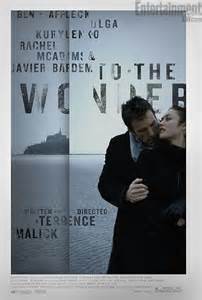The primary difference between a photograph and a film is that the photograph captures a moment while the film expresses a feeling. In the best-case scenario, either one is capable of doing a significant amount of both (because what is a film, really, if not a series of moving pictures?). In that spirit comes Terrence Malick’s To The Wonder – an immaculately-conceived piece of cinema that struggles to maintain a strict balance between essence and feeling, very often missing the sweet spot in between.
Front and center, newborn Oscar-darling, Ben Affleck, whose character doesn’t utter an audible line of dialogue until a full 40 minutes into the film. Contextually speaking, Malick is riffing on the crucial role of communication here, or perhaps the general lack thereof. Out of all the major characters in this film, Javier Bardem’s says the most, and – at least in the majority of cases – Bardem is either speaking rhetorically to himself, his congregation or his God. Olga Kurylenko plays the female lead (Rachel McAdams only appears in the film for a little over 15 minutes), and it would seem as if the Ukrainian-born actress was specifically cast in an effort to exploit the language barrier between her character and Affleck’s.
It probably bears noting that Christian Bale was originally attached to play Affleck’s character, and – as a result – it’s difficult to watch To The Wonder without considering how Bale might have approached the role differently. It’s also difficult to watch without wondering whether Terrence Malick’s persistent threat of dogma might have chased Christian Bale away (Oddly enough, Bale is already attached to play a role in one of Malick’s upcoming projects, and he also worked with Malick on The New World, so perhaps it was just a case of right director, bad timing).
To The Wonder deals with a number of elaborate themes, each of them hedging toward the notion that Love – love of anything, whether it be love of life, love of self, love of others, love of work – is both desperate and fleeting, at best. In the end what we’re left with is a barren, almost-empty landscape, one in which most characters hopscotch from one uneven square to another, just trying their utmost to do the least amount of damage in between. God is here, God is there, God is everywhere. But the only way you’ll find him is if you’ve somehow given up on just about everything else along the way.
It’s a somber message, to be sure. And yet Malick delivers it with such gravitas that it’s difficult to argue against him. The main sticking point with To The Wonder is that – unlike a photograph – Malick’s film does not allow viewers the constant freedom to simply walk away before the feeling fades. And the shame of that is, Malick may very well have stumbled onto something here, if only he hadn’t muddled around with it so long as to render the overwhelming splendor completely lost in translation.
(To The Wonder arrives in limited release this Friday, with plans for a rollout in most major cities to follow.)

